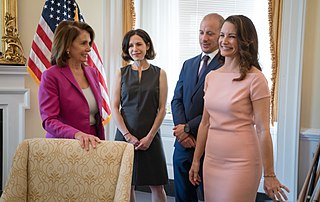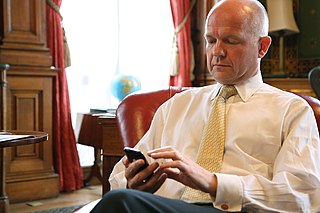Related Research Articles

The United States Department of State (DOS), or simply the State Department, is an executive department of the U.S. federal government responsible for the country's foreign policy and relations. Equivalent to the ministry of foreign affairs of other nations, its primary duties are advising the U.S. president on international relations, administering diplomatic missions, negotiating international treaties and agreements, and representing the U.S. at the United Nations. The department is headquartered in the Harry S Truman Building, a few blocks from the White House, in the Foggy Bottom neighborhood of Washington, D.C.; "Foggy Bottom" is thus sometimes used as a metonym.
Worldcon, or more formally the World Science Fiction Convention, the annual convention of the World Science Fiction Society (WSFS), is a science fiction convention. It has been held each year since 1939. The members of each Worldcon are the members of WSFS, and vote both to select the site of the Worldcon two years later, and to select the winners of the annual Hugo Awards, which are presented at each convention.

A nonprofit organization (NPO), also known as a nonbusiness entity, nonprofit institution, or simply a nonprofit, is a legal entity organized and operated for a collective, public or social benefit, as opposed to an entity that operates as a business aiming to generate a profit for its owners. A nonprofit organization is subject to the non-distribution constraint: any revenues that exceed expenses must be committed to the organization's purpose, not taken by private parties. Depending on the local laws, charities are regularly organized as non-profits. A host of organizations may be nonprofit, including some political organizations, schools, hospitals, business associations, churches, foundations, social clubs, and consumer cooperatives. Nonprofit entities may seek approval from governments to be tax-exempt, and some may also qualify to receive tax-deductible contributions, but an entity may incorporate as a nonprofit entity without having tax-exempt status.

The Emmy Awards, or Emmys, are an extensive range of awards for artistic and technical merit for the American and international television industry. A number of annual Emmy Award ceremonies are held throughout the calendar year, each with their own set of rules and award categories. The two events that receive the most media coverage are the Primetime Emmy Awards and the Daytime Emmy Awards, which recognize outstanding work in American primetime and daytime entertainment programming, respectively. Other notable U.S. national Emmy events include the Children's & Family Emmy Awards for children's and family-oriented television programming, the Sports Emmy Awards for sports programming, News & Documentary Emmy Awards for news and documentary shows, and the Technology & Engineering Emmy Awards and the Primetime Engineering Emmy Awards for technological and engineering achievements. Regional Emmy Awards are also presented throughout the country at various times through the year, recognizing excellence in local and statewide television. In addition, the International Emmy Awards honor excellence in TV programming produced and initially aired outside the United States.
In the United States, federal grants are economic aid issued by the United States government out of the general federal revenue. A federal grant is an award of financial assistance from a federal agency to a recipient to carry out a public purpose of support or stimulation authorized by a law of the United States.
The Fulbright Program, including the Fulbright–Hays Program, is one of several United States Cultural Exchange Programs with the goal of improving intercultural relations, cultural diplomacy, and intercultural competence between the people of the United States and other countries through the exchange of persons, knowledge, and skills. Via the program, competitively-selected American citizens including students, scholars, teachers, professionals, scientists, and artists may receive scholarships or grants to study, conduct research, teach, or exercise their talents abroad; and citizens of other countries may qualify to do the same in the United States.
In international relations, public diplomacy broadly speaking, is any of the various government-sponsored efforts aimed at communicating directly with foreign publics to establish a dialogue designed to inform and influence with the aim of building support for the state's strategic objectives. These also include propaganda. As the international order has changed over the twentieth century, so has the practice of public diplomacy. Its practitioners use a variety of instruments and methods ranging from personal contact and media interviews to the internet and educational exchanges.

Goodwill ambassador is a post-nominal honorific title, a professional occupation and/or authoritative designation that is assigned to a person who advocates for a specific cause or global issue on the basis of their notability such as a public figure, advocate or an authoritative expert. Sometimes the role of a goodwill ambassador is presented as "Ambassador" or "Goodwill Ambassador" preceding the first and last name, the titled name of the individual is always presented with an organizational, regional or national affiliation. Goodwill ambassadors generally deliver goodwill by promoting ideals or positions from one entity to another, or to a population to establish a benevolent relationship. A goodwill ambassador may be an individual from one country who resides in or travels to another country on a diplomatic mission at a peer to peer level. This can be country to country, state to state, city to city, or as an intermediate emissary representative of the people of a specific organization or cultural group, such as an indigenous tribe, marginalized people or enclave population.

Fundraising or fund-raising is the process of seeking and gathering voluntary financial contributions by engaging individuals, businesses, charitable foundations, or governmental agencies. Although fundraising typically refers to efforts to gather money for non-profit organizations, it is sometimes used to refer to the identification and solicitation of investors or other sources of capital for for-profit enterprises.

American Foreign Service Association (AFSA), established in 1924, is the professional association of the United States Foreign Service. With over 15,000 due-paying members, AFSA represents 28,000 active and retired Foreign Service employees of the Department of State and Agency for International Development (AID), as well as smaller groups in the Foreign Agricultural Service (FAS), Foreign Commercial Service (FCS), and International Broadcasting Bureau (IBB).

The National Democratic Institute (NDI) is a non-profit American non-governmental organization whose stated mission is to "support and strengthen democratic institutions worldwide through citizen participation, openness and accountability". It is funded primarily by the United States and other Western governments, by major corporations and by nonprofits like the Open Society Foundations.

Giles Scott-Smith is a Dutch-British academic. He is a professor of transnational relations and new diplomatic history at Leiden University and serves as the dean of Leiden University College The Hague.
Nicholas J. Cull is a historian and professor in the Master's in Public Diplomacy program at the Annenberg School for Communication and Journalism at the University of Southern California. He was the founding director of this program and ran it from 2005 to 2019.
In the United States, federal assistance, also known as federal aid, federal benefits, or federal funds, is defined as any federal program, project, service, or activity provided by the federal government that directly assists domestic governments, organizations, or individuals in the areas of education, health, public safety, public welfare, and public works, among others.
The United States Department of State, like other agencies of the U.S. federal government, gives civilian decorations for outstanding service, sacrifice, or heroism. The criteria for the awards are set down in 3 FAM 4820 - Foreign Affairs Manual, 3 FAM - Personnel, section 3 FAM 4800 Department Awards Program.
A foundation in the United States is a type of charitable organization. However, the Internal Revenue Code distinguishes between private foundations and public charities. Private foundations have more restrictions and fewer tax benefits than public charities like community foundations.
Michael Oren Fitzgerald is an author, editor and entrepreneur. He and his wife, Judith Fitzgerald, have an adult son and live in Bloomington, Indiana.
The Outies, formally known as the Out & Equal Workplace Awards, is an annual awards gala hosted by Out & Equal Workplace Advocates. The Outies honor individuals and organizations that are leaders in advancing equality for lesbian, gay, bisexual, and transgender (LGBT) employees in America's workplaces. The awards are presented annually at the Out & Equal Workplace Summit, a nationwide conference addressing LGBT issues in the workplace.

Twitter diplomacy, or Twiplomacy, is a form of digital diplomacy, refers to the practice of conducting public diplomacy using the social media platform X by heads of state and diplomats, as well as leaders of intergovernmental organizations (IGOs).

Nancy Beth Jackson was an American chemist. She did energy research on heterogeneous catalysis and the development of alternative fuels. She also worked in the field of chemical nonproliferation, educating chemical professionals on the importance of safe and secure chemical practice in research, teaching and business, in an effort to prevent the misuse of chemicals as "weapons, poisons, explosives or environmental pollutants". She was the first implementer in developing the international Chemical Security Engagement Program. She was active in promoting diversity in STEM fields. She was president of the American Chemical Society in 2011, leading the organization during the International Year of Chemistry. In 2012, she was honored with the AAAS Award for Science Diplomacy.
References
- ↑ Glenn Kessler (10 January 2007). "U.S. Overseas Image Gets New Focus". The Washington Post . Retrieved 21 August 2012.
- 1 2 US Department of State: Benjamin Franklin Award for Public Diplomacy
- 1 2 "Awards". June 9, 2024. Retrieved June 9, 2024.